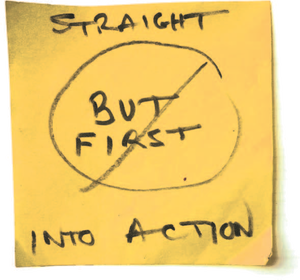Beware These Sneaky Energy Vampires
Alan P. Brown
Download PDF
Imagine if you had more energy every day… what would you do with it?
Start on that project you’ve been putting off? Finish that thing that you just haven’t had the energy to finish? (Did someone say taxes?) Focus a little extra time on just getting organized so you’re more ready to attack tomorrow with all cylinders firing?
Ideally, we begin each day with a full tank of brain fuel, but throughout the day we’re burning it off. And while some of our energy is burned in the doing of important things, we’re burning energy on unimportant and avoidable things—consciously and not-so-consciously.
I call them Energy Vampires. Things we do, thoughts we think and people we know that sneakily vampire our energy.
The high cost of Energy Vampires
“Each morning I am aware that there is a finite amount of time and energy in this day.”
—Oprah Winfrey
Oprah knows about Energy Vampires. She is a very, very busy woman, and because of that, she uses this mantra to remind herself to beware unimportant things that can suck her precious energy away.
And we are very, very busy people too, are we not? I mean, are we ever “caught up”? And in the chasing of that noble goal, are we not always butting up against an empty fuel tank at some point in our day?
Often, it seems, before we’ve even begun our real work?
Our energy is indeed precious. And its premature burn-off every day means our home remains cluttered, our chores incomplete, our projects handed in late, etc.
But ultimately, energy is a key factor in our inability to be fulfilled and live to our potential. This is the ultimate cost of Energy Vampires.
So what can we do? We must first know them—which can be tricky, as some are more obvious while others wear a cloak of invisibility.
Some of the more obvious Energy Vampires
Here are some things we probably know are unduly costing us energy, but that we keep doing nonetheless.
 Staying up late. Too little sleep saps our mental energy. We of course can feel it on days (or during weeks) we haven’t slept enough or well enough. Yet a significant percentage of the people I work with have an unhealthy habit of being on their devices at night—either postponing their heading off to bed, or worse, sitting in bed with their devices postponing their falling asleep until after midnight.
Staying up late. Too little sleep saps our mental energy. We of course can feel it on days (or during weeks) we haven’t slept enough or well enough. Yet a significant percentage of the people I work with have an unhealthy habit of being on their devices at night—either postponing their heading off to bed, or worse, sitting in bed with their devices postponing their falling asleep until after midnight.
But-firsting. This is where we try to sit down to work on an important, difficult task, but then think, “But first let me just do this [un-important thing]… Oh, and I might as well also just quickly do this other [non-urgent] thing…” until we’ve but-firsted enough times to have a large portion of the energy needed for that truly important task.
Pseudoproductivity. Related to but-firsting, this is when you’re justifying working on stuff that really isn’t important right now, because it still feels “productive.” Checking email repeatedly; doing other low-value tasks instead of working on your Biggies (your truly important things, which will tend to be less easy); deleting and reorganizing emails and files.
Interacting with people. Nothing wrong with this, of course. But a ten-minute water-cooler chat with some coworkers debits a good bit of energy from your account, as does a non-urgent text or email exchange with a friend.
Social media and games. Yes, we tend to view these as “breaks” from our work. But we also know, deep down, that they are more likely “escapes” from our important work, and that we don’t tend to emerge from a scrolling or gaming session refreshed and ready to rock.
Some sneakier Energy Vampires
But many of the biggest Energy Vampires are less obvious. A few quick examples.
Lousy brain fuel. If you’re using sugar or simple carbs (crackers, chips, etc.) to get mental energy, you’re using fast-burning fuel. Protein is where the sustained energy is.
Sedentary lifestyle. Regular exercise increases mental stamina, and doing the opposite ensures you will starve for mental energy when you need it.
Multitasking. Not only when you multitask are you doing nothing fast, you are wasting energy in constantly switching between, and re-engaging in, the multiple activities.
Clutter. Psychologist and burnout authority Dr. Sherrie Bourg Carter says, “Clutter makes our senses work overtime on stimuli that aren’t necessary or important.” Clutter also makes it more difficult to relax, both physically and mentally—further stealing your precious energy.
The Zeigarnick effect. This is what happens when we maintain a to-do list with too many things on it. Or keep piles of unprocessed papers in our line of sight. Anything that represents lots of undone to-dos burns mental energy with reminders of all your un-doneness.
And we must beware…
The sneakiest Energy Vampires
These are things we do in our minds every day (sometimes throughout the day) without realizing we’re doing them. And they can be the most egregious of energy-burners.
Complaining. Most of the complaining we do has zero impact in changing the thing about which we’re complaining—making it an energy-sucking black hole.
Dr. Guy Winch, author of The Squeaky Wheel, notes that 95% of consumers who have an issue with a product don’t complain to the company, but will tell their woes to countless friends. (With all that complaining getting formulated and rehearsed in our inner dialogue.) Winch says, “We’ve forgotten what complaining is for—which is to get to some better outcome.” Instead we tend to just vent—which fires up our stress response and vampires our energy.
Ruminating. When you ruminate about how overwhelmed you are, you vampire energy that could be applied to an effort that could help you get caught up. Replaying the mistake you made yesterday, or obsessing about something that didn’t go your way, eats away at your ability to concentrate on something that could move you forward. Listen carefully for any of the triumvirate of rumination: coulda, woulda, and shoulda.
Defending your point of view. We all want to defend what we believe to be factually and morally right. But here’s the thing: Whether about science, politics, religion or the perfectness of your child, most of the time you’re defending your point of view. (A) It is NOT going to result in an alteration of someone else’s point of view, and (B) it’s taking place up in your headspace and NOT in an actual venue for others to consider.
We vampire away truckloads of energy as we walk around semiconsciously formulating our points of view, rehearsing our arguments and counterarguments, in anticipation of some future glorious debate slap-down… that rarely takes place.
But there’s some good news…
First, just becoming more aware of these Energy Vampires can help you counter them. Indeed, when you focus more of your attention on your energy, you can’t help but catch yourself more often in the act of vampiring your energy.
Second, there is a range of specific ways to battle Energy Vampires.
Energy Vampire Slayers
Let’s start with some proven quick-wins for specific situations.
Vampire: Too much social media and/or games across your day.
Vampire Slayer: Schedule guilt-free time for social media and gaming. These activities are not inherently evil—and if you schedule a time, say, at 2 PM each day, to enjoy a little bit of this, you won’t be as inclined to “sneak it in” throughout the day.
Vampire: Repeatedly checking emails throughout the day, one of the most common forms of “multitasking.”
Vampire Slayer: Set specific times for email checking. And make it realistic—if you tell yourself, “I’ll only check emails twice a day!” and you typically check email twice every ten minutes… well, you know how that’ll go. So be okay making a twice-an-hour rule.
Vampire: But-firsting instead of going directly into action on your first big task/project/work session of the day. This is a vampire I battle every single day.
Vampire Slayer: Make a “No But-First” sticky note and keep it where you’ll be sure to see it whenever/wherever you do most of your work. Here’s the sticky I see every morning when I open my planner!

Finally, here are a couple of general Vampire slaying strategies.
Make a stop-it list. This is a list of your most common Energy Vampires that you’d like to stop doing, placed where you’ll see it every morning or, ideally, throughout your day. This simple hack helps keep these no-nos top-of-mind, making it easier for you to catch yourself in the act and correct course.
Create an energy mantra. Oprah’s mantra is a simple statement of reality that we could all use every morning. If you had a similar sticky note on your bathroom mirror and/or fridge and/or computer, and read it aloud once a day, as with the Stop-It List, your top-of-mind awareness to Energy Vampires will increase, and your time-wasting will decrease.
YOU CAN GET SOME BIG ENERGY GAINS by slaying one or more of these Energy Vampires—common everyday habits we all do.
So, give more of your precious ADHD attention to them and see if you can rein them in even a little. You will have loads more energy with which to crush your goals when you do.
 An ADHD/productivity coach and host of Crusher™TV (www.CrusherTV.com), Alan P. Brown is the creative force behind ADD Crusher™, the award-winning video series designed for teens and adults with ADHD. Undiagnosed for decades, his untreated ADHD manifested in underachievement, failed relationships, substance abuse, and worse. Once diagnosed, he found it difficult to learn coping strategies from books, so he developed his own evidence-based “brain hack” strategies while building a successful advertising career and several start-ups. A featured presenter at ADHD conferences in the United States and abroad and a TEDx speaker, he is the #1 best-selling author of Zen and the Art of Productivity. Get Brown’s free eBook, 5 Things You’re Doing Every Day that Make Your ADHD Worse at ADDCrusher.com.
An ADHD/productivity coach and host of Crusher™TV (www.CrusherTV.com), Alan P. Brown is the creative force behind ADD Crusher™, the award-winning video series designed for teens and adults with ADHD. Undiagnosed for decades, his untreated ADHD manifested in underachievement, failed relationships, substance abuse, and worse. Once diagnosed, he found it difficult to learn coping strategies from books, so he developed his own evidence-based “brain hack” strategies while building a successful advertising career and several start-ups. A featured presenter at ADHD conferences in the United States and abroad and a TEDx speaker, he is the #1 best-selling author of Zen and the Art of Productivity. Get Brown’s free eBook, 5 Things You’re Doing Every Day that Make Your ADHD Worse at ADDCrusher.com.
Other Articles in this Edition
The Challenge of Keeping Friends
Is ADHD Related to Eating Difficulties?
Cognitive Disengagement Syndrome
EpicWin as Game-Based Self-Management
Why Are Black Preschoolers with ADHD Expelled?
Launching Successful Young Adults with ADHD
Beware These Sneaky Energy Vampires
How I Manage My Improv-Based Training Business with ADHD

